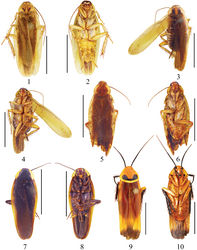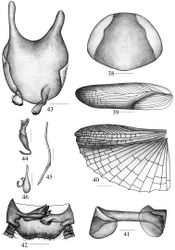Symploce paramarginata
| Notice: | This page is derived from the original publication listed below, whose author(s) should always be credited. Further contributors may edit and improve the content of this page and, consequently, need to be credited as well (see page history). Any assessment of factual correctness requires a careful review of the original article as well as of subsequent contributions.
If you are uncertain whether your planned contribution is correct or not, we suggest that you use the associated discussion page instead of editing the page directly. This page should be cited as follows (rationale):
Citation formats to copy and paste
BibTeX: @article{Wang2013ZooKeys337, RIS/ Endnote: TY - JOUR Wikipedia/ Citizendium: <ref name="Wang2013ZooKeys337">{{Citation See also the citation download page at the journal. |
Genus: Symploce
Name
Symploce paramarginata Wang & Che, 2013 sp. n. – Wikispecies link – ZooBank link – Pensoft Profile
Description
Length, male, pronotum: length × width: 3.5 × 4.0mm; tegmen 13.0mm; overall length including tegmen 14.5–16.5 mm. Body dark brown (Fig. 7), vertex and ocellar spot reddish brown and face black. Antenna and maxillary palpomus dark brown (Fig. 8). Pronotum with disc black and lateral borders orange (Figs 7, 38). Tegmina brown, legs reddish brown and abdomen reddish or blackish brown (Fig. 7). Vertex with interocular space distinctly wider than distance between antennal sockets, and ocellus width slightly less than distance between antennal sockets. Third and fourth maxillary palpomus about same length, both distinctly longer than the fifth. Tegmen with apical posterior branch behind radius vein, and the branch bifurcated, one of the second division further branched (Fig. 39). Hind wing with radius vein branched over the middle and the branches bifurcated at apex; both median and cubitus veins slightly curved, median vein simple, but cubitus veins with 2-3 complete and 1-4 incomplete branches, and triangular apical area reduced and small (Fig. 40). Anteroventral margin of front femur type B3, pulvilli present on 4 proximal tarsomeres, tarsal claws symmetrical and unspecialized, and arolia present. First abdominal tergum (T1) specialized with a tuft of hair; seventh abdominal tergum (T7) unmodified; and ninth abdominal tergum (T9) with lateral plates similar, not produced and unspecialized (Fig. 41).
Male genitalia. Supra-anal plate (Fig. 42) symmetrical and trapeziform, hind margin slightly concave. Right and left paraproct (Fig. 42) dissimilar, right paraproct with spine-like process on the base. Subgenital plate asymmetrical, left side thickened and upturned, right side slightly upturned; two styli similar and padlike, both apices with minute spines (Fig. 43). Hook of left phallomere large and robust at apex and slender at hook portion, on left side, with V-shaped and subapical incision (Fig. 44); median phallomere distinctly curved at middle and lanciform, and apex spine-like and acute (Fig. 45). right phallomere (Fig. 46) same to that of Symploce torchaceus.
Female is similar to male; supra-anal plate symmetrical and trapeziform; subgenital plate simple and hind margin round.
Materials examined
Holotype, male, China: Guizhou Prov., Maolan, 24 May 1998, coll. Zizhong Li. Paratypes, two males, China: Guangxi Prov., Huaping, 6 November 1963, coll. Jikun Yang; one male, China: Hainan Prov., 25 October 1997, coll. Maofa Yang; one male, China: Guangxi Prov., Jinxiu, 13 May 1999, coll. Xingke Yang; two females, China: Guangxi Prov., Napo, 19 October 2000, coll. Wenzhu Li & Jun Chen; two females, China: Guangxi Prov., Cheng Fang, 25 November 1999, coll. Yanzhou Zhang.
Remarks
The new species superficially resembles Episymploce marginata Bey-Bienko, but can be distinguished from the latter by: 1) seventh abdominal tergum unmodified, the latter with two broad sockets covered with hair, 2) subgenital plate with two appendages which is not bifurcated, the latter with apex of appendage bifurcated.
Based on type of vein, the unmodified seventh tergum and symmetrical supra-anal plate, this species should be placed in Symploce, and the species is different from other species in this genus for it’s dark brown colors and special macula on pronotum.
Etymology
The Latin word “paramarginata” refers to the superficial resemblance of this species to Episymploce marginata Bey-Bienko.
Original Description
- Wang, Z; Che, Y; 2013: Three new species of cockroach genus Symploce Hebard, 1916 (Blattodea, Ectobiidae, Blattellinae) with redescriptions of two known species based on types from Mainland China ZooKeys, 337: 1-18. doi
Images
|

